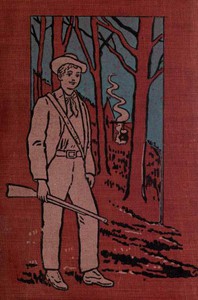Driven from Home; Or, Carl Crawford's Experience by Jr. Horatio Alger (epub ebook reader .TXT) 📗

- Author: Jr. Horatio Alger
Book online «Driven from Home; Or, Carl Crawford's Experience by Jr. Horatio Alger (epub ebook reader .TXT) 📗». Author Jr. Horatio Alger
“I was in my room at the hotel—no, I was taking a walk. I had received news of my mother’s illness, and I was so much disturbed and grieved that I could not remain indoors.”
“You were seen to enter the office of this factory with Mr. Gibbon, and after ten minutes came out with the tin box under your arm.”
“Who saw me?” demanded Stark, uneasily.
Carl Crawford came forward and answered this question.
“I did!” he said.
“A likely story! You were in bed and asleep.”
“You are mistaken. I was on watch behind the stone wall just opposite. If you want proof, I can repeat some of the conversation that passed between you and Mr. Gibbon.”
Without waiting for the request, Carl rehearsed some of the talk already recorded in a previous chapter.
Phil Stark began to see that things were getting serious for him, but he was game to the last.
“I deny it,” he said, in a loud voice.
“Do you also deny it, Mr. Gibbon?” asked Mr. Jennings.
“No, sir; I admit it,” replied Gibbon, with a triumphant glance at his foiled confederate.
“This is a conspiracy against an innocent man,” said Stark, scowling. “You want to screen your bookkeeper, if possible. No one has ever before charged me with crime.”
“Then how does it happen, Mr. Stark, that you were confined at the Joliet penitentiary for a term of years?”
“Did he tell you this?” snarled Stark, pointing to Gibbon.
“No.”
“Who then?”
“A customer of mine from Chicago. He saw you at the hotel, and informed Carl last evening of your character. Carl, of course, brought the news to me. It was in consequence of this information that I myself removed the bonds from the box, early in the evening, and substituted strips of paper. Your enterprise, therefore, would have availed you little even if you had succeeded in getting off scot-free.”
“I see the game is up,” said Stark, throwing off the mask. “It’s true that I have been in the Joliet penitentiary. It was there that I became acquainted with your bookkeeper,” he added, maliciously. “Let him deny it if he dare.”
“I shall not deny it. It is true,” said Gibbon. “But I had resolved to live an honest life in future, and would have done so if this man had not pressed me into crime by his threats.”
“I believe you, Mr. Gibbon,” said the manufacturer, gently, “and I will see that this is counted in your favor. And now, gentlemen, I think there is no occasion for further delay.”
The two men were carried to the lockup and in due time were tried. Stark was sentenced to ten years’ imprisonment, Gibbon to five. At the end of two years, at the intercession of Mr. Jennings, he was pardoned, and furnished with money enough to go to Australia, where, his past character unknown, he was able to make an honest living, and gain a creditable position.
CHAPTER XXVIII. AFTER A YEAR.
Twelve months passed without any special incident. With Carl it was a period of steady and intelligent labor and progress. He had excellent mechanical talent, and made remarkable advancement. He was not content with attention to his own work, but was a careful observer of the work of others, so that in one year he learned as much of the business as most boys would have done in three.
When the year was up, Mr. Jennings detained him after supper.
“Do you remember what anniversary this is, Carl?” he asked, pleasantly.
“Yes, sir; it is the anniversary of my going into the factory.”
“Exactly. How are you satisfied with the year and its work?”
“I have been contented and happy, Mr. Jennings; and I feel that I owe my happiness and content to you.”
Mr. Jennings looked pleased.
“I am glad you say so,” he said, “but it is only fair to add that your own industry and intelligence have much to do with the satisfactory results of the year.”
“Thank you, sir.”
“The superintendent tells me that outside of your own work you have a general knowledge of the business which would make you a valuable assistant to himself in case he needed one.”
Carl’s face glowed with pleasure.
“I believe in being thorough,” he said, “and I am interested in every department of the business.”
“Before you went into the factory you had not done any work.”
“No, sir; I had attended school.”
“It was not a bad preparation for business, but in some cases it gives a boy disinclination for manual labor.”
“Yes; I wouldn’t care to work with my hands all my life.”
“I don’t blame you for that. You have qualified yourself for something better. How much do I pay you?”
“I began on two dollars a week and my board. At the end of six months you kindly advanced me to four dollars.”
“I dare say you have found it none too much for your wants.”
Carl smiled.
“I have saved forty dollars out of it,” he answered.
Mr. Jennings looked pleased.
“You have done admirably,” he said, warmly. “Forty dollars is not a large sum, but in laying it by you have formed a habit that will be of great service to you in after years. I propose to raise you to ten dollars a week.”
“But, sir, shall I earn so much? You are very kind, but I am afraid you will be a loser by your liberality.”
Mr. Jennings smiled.
“You are partly right,” he said. “Your services at present are hardly worth the sum I have agreed to pay, that is, in the factory, but I shall probably impose upon you other duties of an important nature soon.”
“If you do, sir, I will endeavor to





Comments (0)